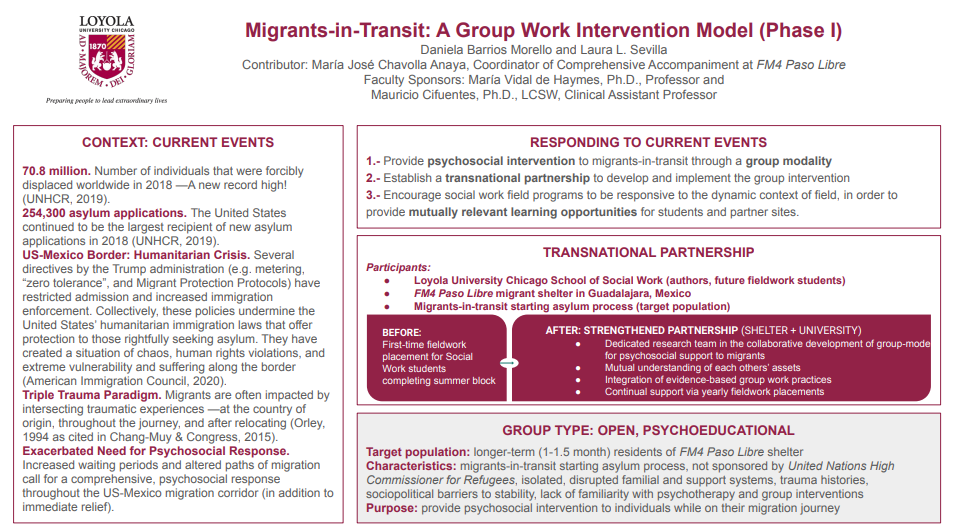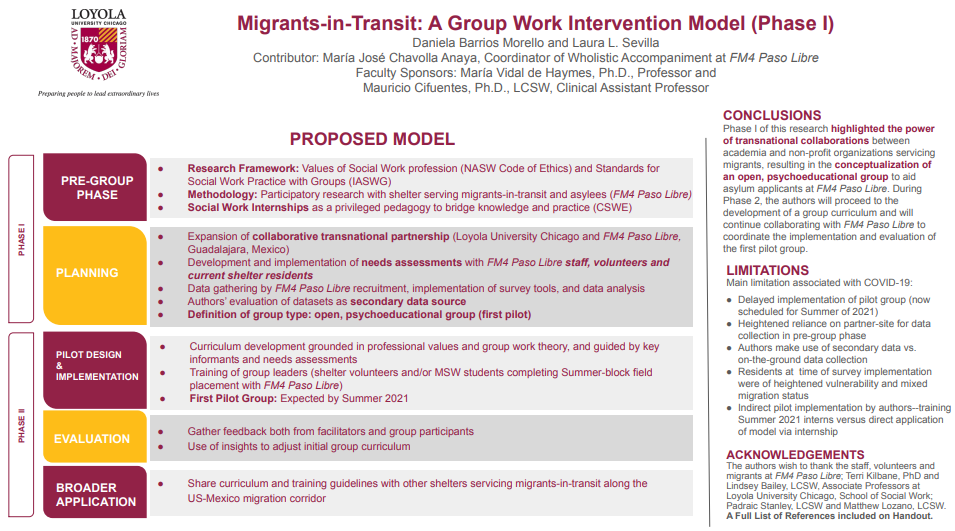Migrants in Transit: A Proposed Model for Group Work Intervention
Daniela Barrios Morello, Loyola University Chicago, Chicago, IL (USA)
Laura Sevilla, Loyola University Chicago, Chicago, IL (USA)
This poster describes the process of developing meaningful group work interventions targeting migrants in transit. Grounded in a transnational partnership between a midwestern university and a shelter in Mexico, it is hoped that this project will promote the development of group work interventions that may be adapted to the needs of migrants, asylum seekers, and refugees as a way to help counteract their multiple stressors and support their socioemotional wellbeing.
View PDF of Poster / To learn more, download the Presentation Handout.
Presentation Description:
According to the 2018 Global Trends Report by the United Nations High Commissioner for Refugees (UNHCR), “The global population of forcibly displaced increased by 2.3 million people in 2018. By the end of the year, almost 70.8 million individuals were forcibly displaced worldwide as a result of persecution, conflict, violence, or human rights violations. As a result, the world’s forcibly displaced population remained yet again at a record high.” (UNHCR, 2019, p. 2). In 2018, the United States continued to be the largest recipient of new asylum applications (254,300), simultaneously reporting families to be a third (35%) of all apprehensions at the border (UNHCR, 2019; Bialik, 2019). Reactive transnational policy aimed at stemming migration, such as the Migrant Protection Protocols (MPP), has only put migrants at a higher risk by sending over 60,000 asylum seekers back to Mexico, “where they’re under threat from drug cartels and kidnappers and are dependent on volunteers for basic supplies” (Narea, 2020). The physical and emotional challenges posed by migration are compounded in policy and the inherent loss of social support. Despite networks providing immediate relief (e.g. shelters, nonprofits agencies,) increased waiting periods and altered paths of migration call for a more comprehensive psychosocial response.
Guided by the IASWG’s Standards for Social Work Practice with Groups, this project outlines the planning and creation of a short-term model for engaging migrants in transit through a mutual aid group. The project is grounded in a transnational partnership between a large midwestern university and a migrant shelter located in Mexico. The poster will illustrate the process followed by the two authors when designing the proposed group, including: 1) identifying gaps in services, 2) performing a needs assessment with the shelter, and 3) developing a group work curriculum based on the assessment and relevant group work theory. It is expected that the second phase of the project will consist of implementation, evaluation, and further adjustments to the pilot model.
The hope is for this transnational project to highlight the importance of establishing collaborative alliances between universities and personnel running migrant shelters in order to better serve the needs of migrants through culturally sensitive group work interventions grounded in relevant theories, including group work dynamics with vulnerable populations (Schiller, 2007) and desired therapeutic factors (Yalom & Leszcz, 2008). Considering that group work theories focused on migrants in transit are limited, the authors will also draw inspiration from interventions being implemented by social workers and other helping professionals in the US-Mexico borderlands.
Finally, the aim is to promote the development of group work interventions that may be adapted to the needs of migrants in transit, asylum seekers, and refugees in settlement camps, as a way to help counteract their multiple stressors and support their wellbeing. Ultimately, the vision is to connect the world’s most vulnerable populations with meaningful group work interventions in order to contribute to a healthier and more just society.
References:
- Bialik, K. (2019, January 16). Border apprehensions increased in 2018 – especially for migrant families.
- Dow, H. (2011). An Overview of Stressors Faced by Immigrants and Refugees: A Guide for Mental Health Practitioners. Home Health Care Management & Practice, 23(3), 210-217.
- Hartley, J. (2008). Academic writing and publishing: A practical handbook. New York: Routledge.
- Hilado, A., & Lundy, M. (Eds.). (2017). Models for practice with immigrants and refugees : Collaboration, cultural awareness, and integrative theory.
- International Association for Social Group with Groups. (2015). Standards for Social Work Practice with Groups.
- International Organization for Migration, World Migration Report 2020 (Geneva: IOM, 2019).
- Narea, N. (2020, February 28). A federal appeals court just blocked Trump’s policy of sending migrants back to Mexico. Vox.
- Schiller, L. (2007). Not for Women Only: Applying the Relational Model of Group Development with Vulnerable Populations. Social Work with Groups, 30(2), 11-26.
- Simon, S.R. (2016). Beyond group work camp: A bridge to symposia and conference participation via professional presentations. Groupwork, 26(3), 75-90.
- United Nations High Commissioner for Refugees, Global Trends: Forced Displacement in 2018 (Geneva: UNHCR, 2019).
- Yalom, I. D., & Leszcz, M. (2008). Theory and practice of group psychotherapy, fifth edition.
View PDF of Poster / To learn more, download the Presentation Handout.



Professor Tully, Daniela and I thank you for your feedback during the presentation. We are grateful to our partner, FM4 Paso Libre, in helping us strategize and design an intervention that will best meet the needs of the migrant-residents there. The hope of the psycho-educational framework would be to provide an accessible entry point for migrants as they continue on their journey--to resettlement or continuing migration. We agree, and hope that the group modality also serves to promote healing through a sense of universality. We thank you for your engagement and suggestions during the poster session.
Hi Professor Kilbane, Thank you very much for your words! Laura and I appreciate that you took the time to meet with us, as your guidance illuminated the steps we needed to take to complete the research. Thank you VERY much!!
Hi Professor Kilbane, Thank you very much for your words! Laura and I appreciate that you took the time to meet with us, as your guidance illuminated the steps we needed to take to complete the research. Thank you VERY much!!
Hi Professor Kilbane, Thank you very much for your words! Laura and I appreciate that you took the time to meet with us, as your guidance illuminated the steps we needed to take to complete the research. Thank you VERY much!!
Daniela and Laura - glad to see your idea come to fruition. You can tell a lot of work went into the conceptualization and planning for this model. I cannot wait to see your next report. You are a great example of the work being done with the migration studies at Loyola University. We are proud to have you as our students.
Daniela and Laura - I think your poster is professionally designed and interesting to read. It provides good scholarship on the subject area, and it engages/excites the reader about this important topic. You thoroughly describe the need for intervention to address the current devastating treatment of this population, and you suggest a very hopeful intervention to help this population with your proposal for implementing groups. I would anticipate that the group members will appreciate the opportunity for mutual aid support benefits they will gain through group discussion with the group worker and with one another (including the group benefit of experiencing a feeling of universality with other group members related to their shared issues), and I also anticipate the group members will appreciate the opportunity for getting some much-needed practical knowledge/education/information they will gain by sharing problem-solving strategies during discussions with the group worker and group members. Good luck on trying to reach the Phase 2 stage of your intervention. Greg Tully, Professor, West Chester University